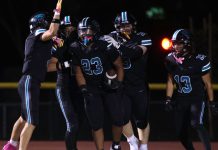A record crowd watched San Jose’s pro baseball team win its home
opener on Thursday night. The single-A San Jose Giants rolled out
the faux red carpet in classic minor league style, with
between-innings contests, semi-hokey promotions, Turkey Mike’s
barbecue and post-game fireworks.
A record crowd watched San Jose’s pro baseball team win its home opener on Thursday night. The single-A San Jose Giants rolled out the faux red carpet in classic minor league style, with between-innings contests, semi-hokey promotions, Turkey Mike’s barbecue and post-game fireworks.
But the celebratory evening glossed over a real dilemma facing the city, like a fresh coat of paint on aging Municipal Stadium.
As San Jose nears becoming the nation’s 10th largest city, civic leaders are stoking residents’ dreams of welcoming Major League Baseball to the South Bay. An organized group, Baseball San Jose, has been stumping to bring in an MLB franchise for better than a year now. In a speech in February, Mayor Ron Gonzales made attracting an MLB franchise a top priority for his remaining two years in office. And, the City Council recently approved a new slate of closed-door discussions aimed at acquiring property just south of the Diridon train station as a site for a new ballpark.
Unfortunately for the city, though, its dreams are likely to remain just that.
MLB Commissioner Bud Selig have been unequivocal in his stance that the South Bay is San Francisco Giants’ territory. Don’t expect that to change any time soon. With its privately financed stadium – and debt service to match – the Giants have little choice but to do everything to protect their huge South Bay fan base. Selig would be a fool to discourage future (albeit extremely rare) efforts to finance stadiums privately by sacrificing the Giants at the altar of San Jose’s dreams.
Truth be told, San Jose is a decade or so late with its MLB dreams. The city’s best chance to attract an MLB franchise came during the 15-plus years from the late 1970’s to the early 1990’s. In those days, it seemed like the Giants and A’s took turns on the leaving-town rumor mill. Twice, the Giants were all but sold and moved, first to Toronto and then to St. Petersburg, Fla. The A’s were courted by owners in Denver and Sacramento.
During that time, South Bay movers and shakers saw their chance, and even placed a tax measure on the ballot to help pay for a major league stadium in hopes of attracting one of the two franchises, or perhaps an expansion team. But their taxpayers, influenced by naysayers who swore that the cost would far outweigh the potential reward, answered with a resounding no thanks.
Now, the karma of those shortsighted days is coming back to haunt San Jose’s big league baseball backers, leaving them in a kind of MLB purgatory.
Fact is, San Jose is much more likely to lose its current pro baseball franchise than to acquire a new one.
When SJ Giants owner Richard Beahrs purchased the team 18 years ago, Municipal Stadium was regarded as one of the California League’s top facilities. But these days, with minor league cities investing millions in new stadiums, the 63-year-old ballpark is thought of as so substandard that the parent organization has insisted on a significant, and costly, upgrade.
Otherwise, it’s only a matter of time before the Giants pack up and leave.
What San Jose should do is invest in its minor league baseball future for now, avoiding the very real threat of losing pro baseball altogether and proving its worthiness as a potential MLB location to boot.
There’s a very real opportunity for San Jose to do just that by taking a graduated approach to elevating its status as an MLB city. Go ahead and build the new downtown stadium, and fill it with a top-notch Triple-A franchise. Say, the Giants’ Triple-A franchise.
Despite signing a new two-year affiliation deal with the Fresno Grizzlies, the Giants organization has been anything but completely pleased with the agreement – a sentiment apparently being expressed by both sides.
Admittedly, this hardly satisfies San Jose’s immediate lust for an MLB franchise. But it could be an essential step toward getting what the city wants in the long term.













